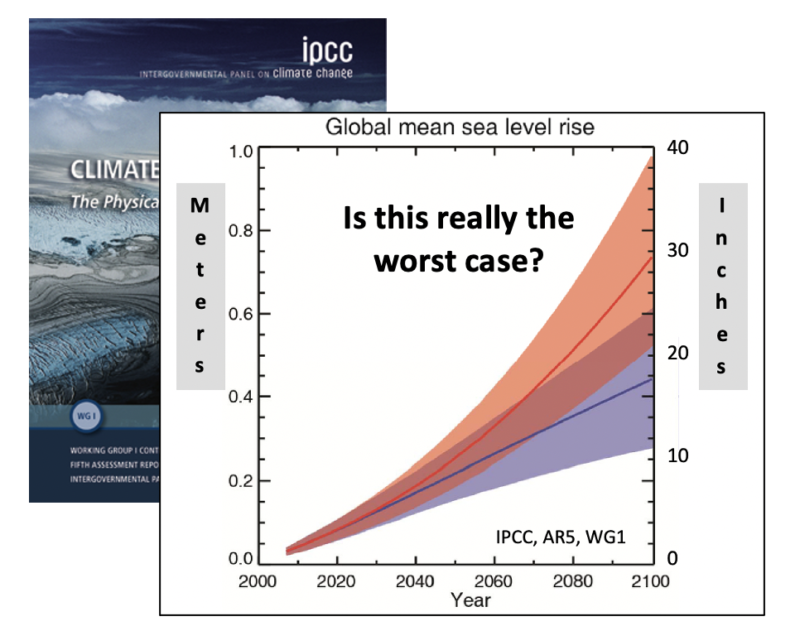Our New Paper Raises the Sea Level “bar”

How high could sea level rise in the coming decades?
In coastal cities worldwide, that question is being asked quite seriously, due to peak water levels at high tide that keep breaking records. About three feet or approximately one meter is the most commonly cited height for global average sea level to increase by the year 2100. That originates from the respected authority, the “IPCC” the Intergovernmental Panel on Climate Change. As shown above that’s how they describe potential sea level rise (SLR) in their graphics and top level summaries. While many assume that the figure indicated is the worst-case scenario, that is no longer true. In the footnotes and fine print, even the IPCC describes the possibility of much higher sea level. Other authorities now consider scenarios for sea level to possibly reach two or three times higher.
The problem is that the IPCC wants to say what will happen, with a high degree of confidence. Unfortunately the melting and collapse of the giant ice sheets of Antarctica and Greenland do not lend themselves to certainty and any kind of precision. It is surprisingly difficult to predict the melting of ice sheets a mile thick that are the size of continents. For example, if just three percent of the ice melts, global sea level would rise more than six feet, almost two meters. There are raging rivers, enormous caverns, lakes, mountains, and volcanoes hidden beneath the Antarctic ice sheet. It is very hard to know what will happen by the end of this century and into the next one, particularly while we are still arguing about policies to replace our use of fossil fuels, the underlying cause of the extraordinary warming.
Last Friday, a scientific paper was published about future sea level rise in the journal One Earth. “Twenty-first century sea-level rise could exceed IPCC projections for strong warming futures.” I was one of the authors. My four co-authors were all leading renowned scientists specializing in climate change, glaciology, and the Arctic: Richard Alley, Robert W. Corell, Eric Rignot, and Martin Siegert, all Ph.D’s. A press release by Imperial College (London), provides an easy to understand description “Ice sheet uncertainties could mean sea level will rise more than predicted.”
Our purpose with the paper was not to criticize the IPCC, but rather to ask them to reconsider how they portray the range of possible sea level. In many ways, it is a question of how to deal with uncertainty. Where an important number can be a wide range, how do you characterize that? The problem is not limited to rising sea level. For example, projections for how much rainfall could occur this century, or how many million acres will be destroyed by wildfires, all have rather wide ranges and uncertainties due to the many variables and their interaction. Where a wide range of scenarios can occur, is it best to state the minimum, the maximum, or a mid-point? Note that we don’t plan for medium hurricanes or earthquakes. Is it better to understate or to overstate?
Climate models, weather models, and hurricane forecasts have all become extremely sophisticated in recent decades. While there is always room for improvement, they are far more accurate than similar tools fifty years ago. Models for the ice sheets and glaciers (the “cryosphere”) are far more rudimentary. The science and models are improving greatly, but are still far behind the precision of those other models. Our article makes the case that it is unlikely that sea level rise this century would be less than a meter, but perhaps twice that chance that it would be substantially higher.
Particularly with the issue of rising sea level it is better to plan higher, both because that is the trend of the evidence and because higher has a margin of safety. Our hope is that those working on the forthcoming IPCC report find a better way to describe the uncertainty for sea level rise over the next eight decades so that we plan for a wider range of adaptation to the rising ocean. Our article was immediately welcomed by the IPCC. We find that encouraging and look forward to their Assessment Report Six (AR6) due to be released in 2021. It’s time to raise the bar.
